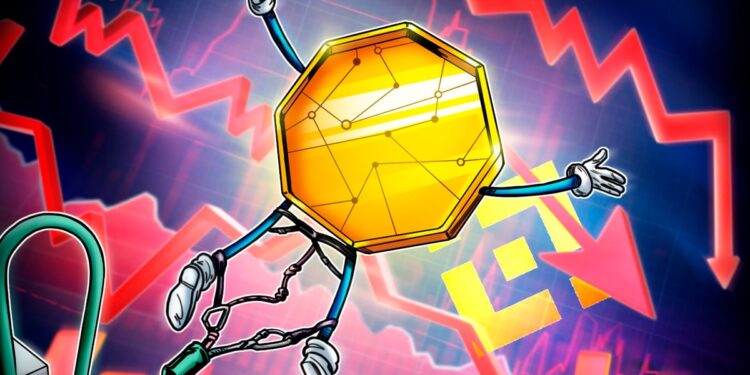Key takeaways
-
Some altcoins, together with Cosmos’s ATOM token, briefly fell close to zero on Binance throughout Friday’s crypto market crash.
-
The identical altcoins held actual market worth on different centralized crypto exchanges.
On Oct. 10, the cryptocurrency suffered its most severe downturn for the reason that FTX collapse, with the full market capitalization dropping by roughly $850 billion inside hours.
Bitcoin (BTC) fell round 10–15%, from highs close to $124,000 to lows of $105,000. Nonetheless, altcoins fared far worse, particularly these traded on Binance, with many plunging 99.99-100% in minutes.
That features tokens like Cosmos (ATOM), IoTeX (IOTX), and Enjin (ENJ), whose costs on Binance briefly hit zero.
As compared, ATOM plunged 53% on rival exchanges, whereas IOTX and ENJ slipped 46% and 64.5%, respectively. None of them, nonetheless, hit zero valuations wherever else, a phenomenon seen solely on Binance.
Why did these altcoins fall to zero?
Practically $20 billion worth of crypto positions were liquidated in the course of the Oct. 9-10 crash, about 20 occasions greater than in the course of the 2020 COVID-19 market rout. Over 1.6 million merchants misplaced their positions as leverage wiped them out.
Many of those merchants used leverage (borrowed cash) on Binance to spice up their income.
BitMEX co-founder Arthur Hayes mentioned that main exchanges, together with Binance, have been “liquidating collateral tied to cross-margin positions,” which exacerbated the sell-off.
Merely put, when costs began falling, Binance routinely bought altcoins used as collateral to cowl losses. This brought on extra promoting stress, which pushed costs down even quicker.
As costs plunged, Binance’s buying and selling programs turned overloaded. Some customers reported frozen accounts, missed stop-losses, and delayed trades.
On the similar time, some analysts acknowledged that market makers like Wintermute withdrew their funds from Binance attributable to these delays.
Associated: Crypto.com CEO calls for probe into exchanges after $20B liquidations
That meant there have been no purchase orders left for just a few moments, so the system confirmed “zero” costs for some cash, though the tokens nonetheless had worth elsewhere.
An analogous “flash crash” occurred in 2017, when Ethereum briefly fell to $0.10 on GDAX after a flood of automated promote orders.
Binance points an apology
Binance co-founder Yi He (Chief Buyer Service Officer) issued an apology, saying that “some customers have encountered points with their transactions” amid excessive volatility and surging platform site visitors.
CEO Richard Teng additionally apologized, stating:
“I’m actually sorry to everybody who was impacted. We don’t make excuses — we pay attention carefully, be taught from what occurred, and are dedicated to doing higher.”
Binance acknowledged that it’ll compensate customers with verifiable losses instantly tied to platform or system failures, clarifying that losses ensuing from worth fluctuations or unrealized positive factors will not be eligible for compensation.
This text doesn’t include funding recommendation or suggestions. Each funding and buying and selling transfer includes danger, and readers ought to conduct their very own analysis when making a call.



















